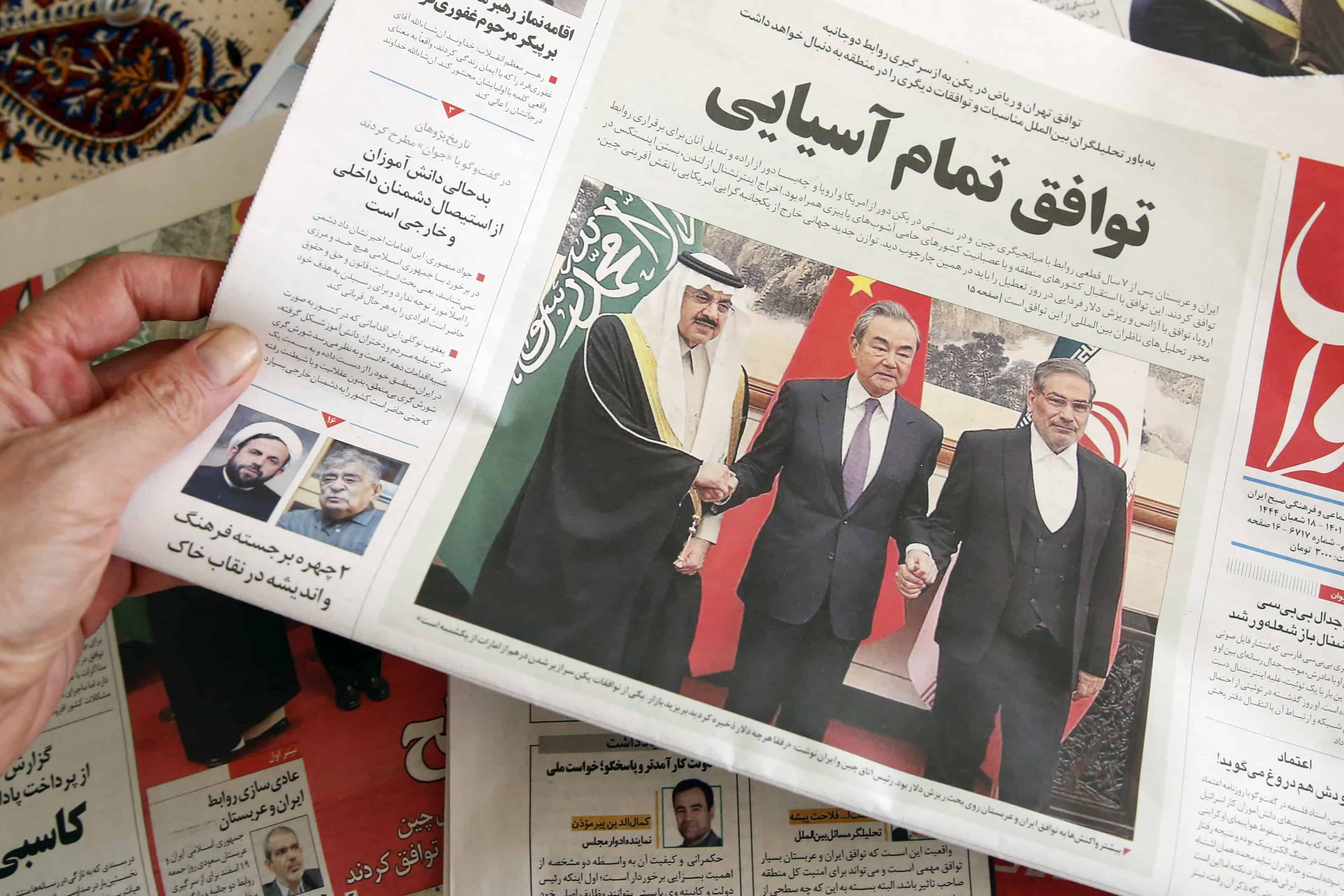Beijing, China – The foreign ministers of Middle East rivals Iran and Saudi Arabia met in Beijing on Thursday, Tehran said, paving the way for normalized ties under a surprise China-brokered deal.
Iranian Foreign Minister Hossein Amir-Abdollahian and his Saudi counterpart Prince Faisal bin Farhan discussed steps towards reopening the embassies and consulates of the two countries, Iran’s foreign ministry said in a statement.
“The foreign ministers of the Islamic republic of Iran and Saudi Arabia negotiated and exchanged opinions with the emphasis on the official resumption of bilateral relations and the executive steps towards the reopening of the embassies and consulates of the two countries,” the statement said.
“The two sides emphasised the importance of following up on the implementation of the Beijing Agreement and its activation in a way that expands mutual trust and the fields of cooperation and helps create security, stability and prosperity in the region,” said the statement, issued after a landmark meeting in Beijing.
China, which brokered Saudi Arabia-Iran rapprochement, also scene for first meeting of foreign ministers of the West Asian states. (All those who kept saying don’t read so much into China’s role – what now?) pic.twitter.com/Hdr5LcLBwa
— Rezaul Hasan Laskar (@Rezhasan) April 6, 2023
Saudi state TV Al Ekhbariya also reported that the two ministers held a meeting in Beijing to “discuss implementing the agreement”, airing footage of the pair shaking hands in front of Saudi and Iranian flags, and then talking and smiling.
On March 10, Tehran and Riyadh announced the agreement to restore relations severed seven years ago when protesters in Iran attacked Saudi diplomatic missions.
The shock rapprochement between mainly-Sunni Muslim Saudi Arabia, the world’s biggest oil exporter, and Shiite-majority Iran, strongly at odds with Western governments over its nuclear activities, has the potential to reshape relations across a region characterized by turbulence for decades.
During phone conversations in March, the ministers had vowed to meet during the Muslim holy month of Ramadan which ends later in April.

Saudi officials had said the ministerial meeting was the next step in restoring ties, and an Iranian statement last week spoke of “the constructive path of relations between the two countries.”
Under last month’s agreement, they are to reopen their embassies and missions within two months and implement security and economic cooperation deals signed more than 20 years ago.
Saudi Arabia severed relations with Iran in January 2016, after protesters attacked its embassy in Tehran and consulate in the Iranian city of Mashhad over Riyadh’s execution of the Saudi opposition Shiite cleric Nimr al-Nimr.
Highlights of the talks
- Iran and Saudi Arabia agree to resume flights and bilateral visits
- Visas, including Umrah visas, to be issued for citizens of both countries
- Diplomatic representations to reopen within a two-month period
- Beijing Agreement implementation aims to enhance mutual trust and cooperation
- Security cooperation agreement and general agreement for cooperation to be activated
- Embassies and general consulates to open in Riyadh, Tehran, Jeddah, and Mashhad
- Consultative meetings to intensify for discussing cooperation and positive prospects
- Enhanced cooperation aims to achieve regional security and stability
Talks between the foreign ministers are expected to be followed by Iranian President Ebrahim Raisi’s visit to Riyadh.
Raisi accepted an invitation from Saudi Arabia’s King Salman, Iran’s First Vice President Mohammad Mokhber confirmed on Monday.
Challenge to US
Iran and Saudi Arabia support rival sides in several conflict zones across the region, including in Yemen, where the Houthi rebels are backed by Tehran and Riyadh leads a military coalition supporting the government.
The two sides also vie for influence in Syria, Lebanon and Iraq.
Riyadh’s traditional ally Washington welcomed the detente agreement, but said it remains to be seen whether the Iranians will “honor their side of the deal”.
China’s success in bringing Iran and Saudi Arabia together has challenged the United States’ long standing role as the main outside power broker in the Middle East.
Officials from Iran and Saudi Arabia held several rounds of dialogue in Baghdad and Oman before they reached the agreement in Beijing.
“Clearing misunderstandings and looking to the future in Tehran-Riyadh relations will definitely lead to the development of regional stability and security,” Iran’s Supreme National Security Council head Ali Shamkhani, who negotiated the deal for his country, said after the deal was struck.
He added that the agreement can “increase cooperation between the countries of the Persian Gulf and the Islamic world to manage the existing challenges.”
In 2016 a number of Gulf countries followed Riyadh’s action in scaling back ties with Tehran, but they have led the way in restoring diplomatic relations.
Iran welcomed an Emirati ambassador last September, after a six-year absence, and on Wednesday named its own ambassador to the UAE, following a nearly eight-year hiatus.
Last year Iran said Kuwait had sent its first ambassador to Tehran since 2016.
Iran has also welcomed a potential rapprochement with Bahrain, a close Saudi ally, which in the past accused Iran of backing a Shiite-led uprising in the Sunni-ruled kingdom, an accusation Tehran denies.
“This positive development can happen in relation to other countries in the region, including Bahrain,” Iran’s Foreign Ministry spokesman Nasser Kanani said last month.

